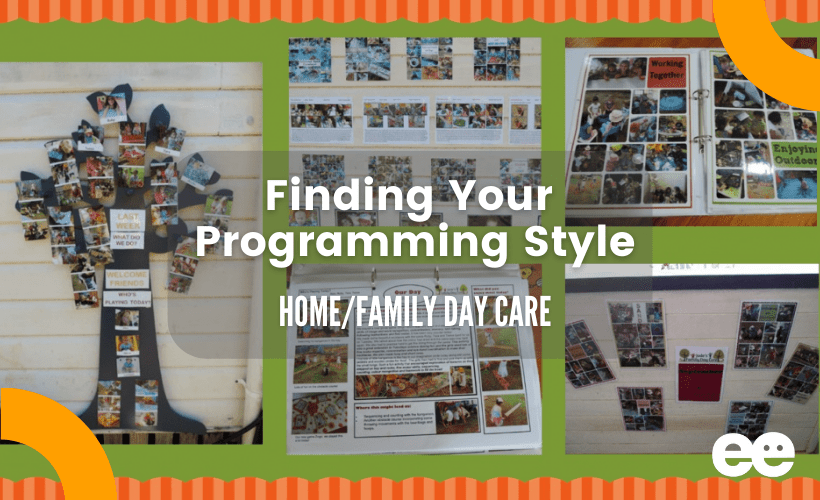
What is a programming style?
I know that most parents won't have time to read this type of program but some do and for the others I always ensure I have plenty of other methods of information and communication available to them so they can gain an understanding of the direction of their child's play and learning. You can see more of my parent communication examples here.
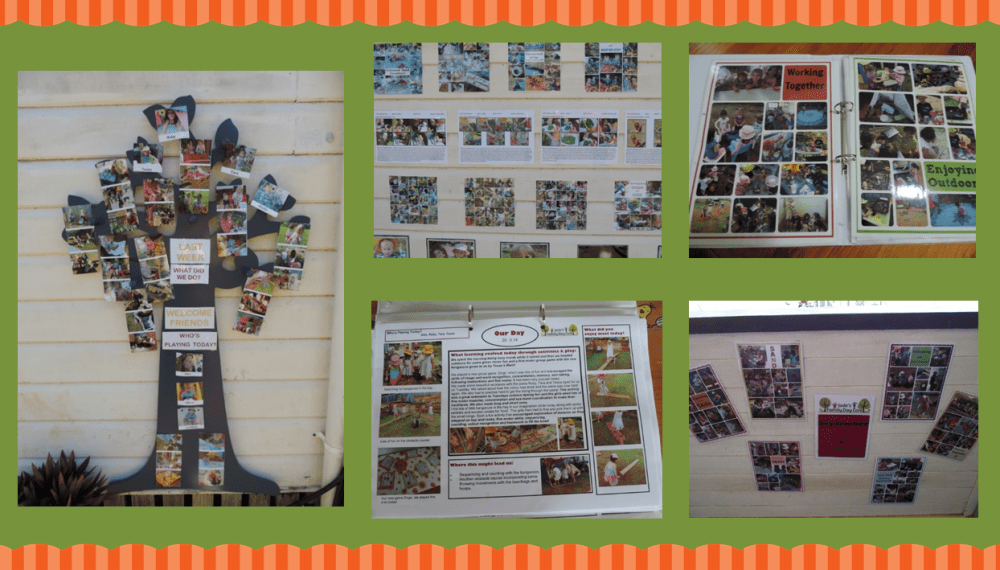
You don't need to solely rely on your program as a method for communicating your planned activities, play and learning to parents. Too many educators (just in my own experience) seem to feel they are writing a program for parents and coordinators and get awfully deflated and frustrated when they don't stop and take time to read all that hard work
“What's the point, it's not like parents read it anyway!” Yep, I have heard it many times and what I reply is “But that program is to benefit you and the children first and foremost and I'm pretty sure you read it and the children get to enjoy the activities and pre planning!” Perhaps time to rethink who you are planning for and who you are trying to please, you might be surprised at how much simpler the process then becomes!

I know many educators have expressed interest though in how I use my program plan since I mentioned it in the part 1 article so I'm going to try to briefly (stop laughing now) describe the main areas for you and then you can decide if it really is the template style for you.
What time frame does my program template cover?
How do I include parent input on my template?
What are the program template box headings for?
But what do the program template box headings mean and how do they relate to the EYLF Outcomes?
Well, as usual this post has become way to long so I'm not sure I can cover all of the thinking behind my box areas. I'll try to add a few dot points under each to give you an idea but as you can see from my example one below, the areas also crossover and link well together at times for certain activities – I add arrows sometimes for my own benefit, there is no need really as coordinators or assessors will be able to see the links for themselves if they have a good understanding of the learning framework.
I haven't included the detail I normally do for focus activities due to privacy reasons but I normally include the planned focus activity from my individual forward planning sheet with the date of relevant initial observation/collage/reflection. See more about how I do my forward planning and linking HERE.
Intentional Teaching Opportunities
Children's Ideas & Interests
The activities I list here are from my individual forward planning sheet and previous observations. They might also be activities that stem from things I have seen in the previous weeks but not actually formally documented. You can read more about how to use this template and download your own to use in THIS EBOOK.
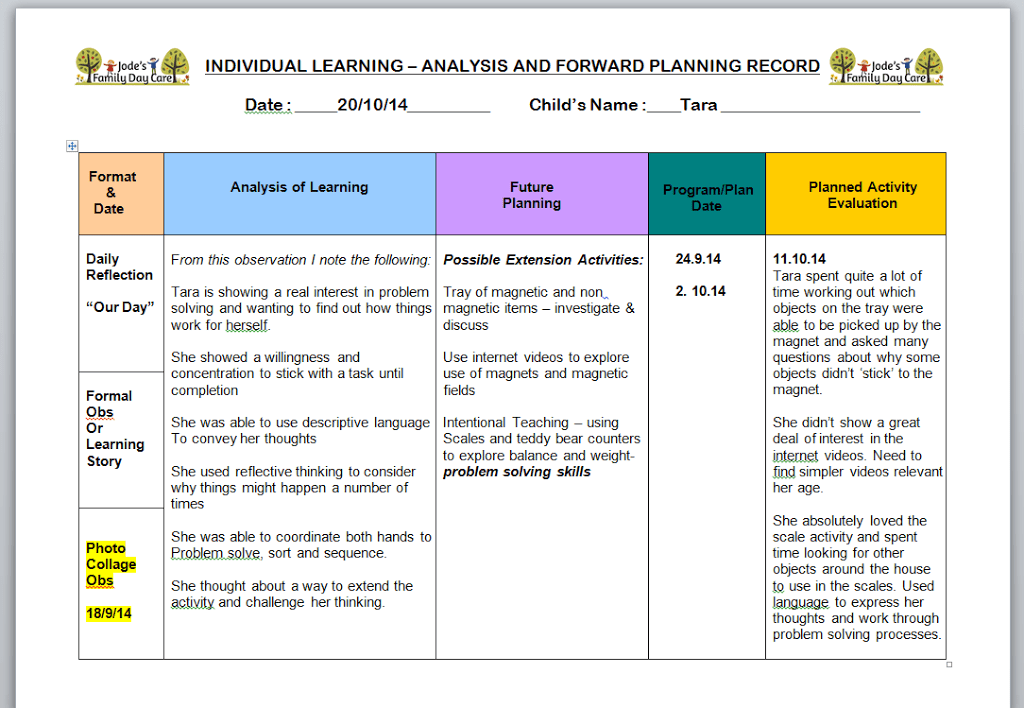
Spontaneous Moments
Family/Coordinator Input
My 7 Learning Areas linking to EYLF Outcomes
These are the 7 learning areas I use in each of the boxes in my program template. Each focus area corresponds to EYLF outcomes so there is no need to add complicated codes, numbers or other time consuming methods - I just add my activities and get ready to play knowing I am offering a varied and comprehensive program covering all areas.
1. Exploring Our World
I mainly include activities here that will encourage an exploration and understanding of the environment around them... food, pets, gardens, land, sustainability, recycling, natural and man made materials/environments, technology and research in these areas...it's one of my favourite boxes as there are always interesting ways to learn in this area no matter how young the child!
2. Inviting our Imagination In
Another area that can incorporate many different activities. It really is about anything that might encourage children to explore their imaginations. Props, invitations to play, opportunities for role play, dramatic play,communication and creative self expression. They might be indoor or outdoor activities.
3. Let's Get Moving
This is pretty self explanatory...any activities that get the kids moving indoors or out and more aware of their bodies and the movements they can do. It's about offering activities that challenge those gross motor skills and muscles! It might be with music & dance, games, stories or songs.
4. Manipulative Play
This is where I list planned activities that will encourage strengthening of fine motor muscles, problem solving, spatial awareness, you get the gist! I include puzzles, blocks, tong games, some craft and anything fine motor here.
5. Creative & Sensory Play
This area often overlaps with many of the other areas obviously but I still find it useful to have a separate section so I can see at a glance our crafty and sensory activities as they are the ones that often require more set up and pre planning. I quite often write the days beside them that I want to do them as this works in with the ages I have on those days currently. No need to do that, I just find it helps in my planning.
6. Encouraging our Identity & Independence
This is the section I include group and individual activities to encourage and promote self help skills, a feeling of belonging, pride in achievements, respect for diversity, understanding and managing of emotions, feeling part of a community,and an increasing responsibility for their own health and wellbeing.
This area can be pretty broad so I try to just incorporate a few activities for each program.
7. Connecting through Communication
This is where I list activities focusing on verbal and non verbal communication, media, technology, music, singing, puppets, dramatic and social play prompts,stories,group games, language skills....basically any activity that will invite discussion and communication in some way.
A Little About Me
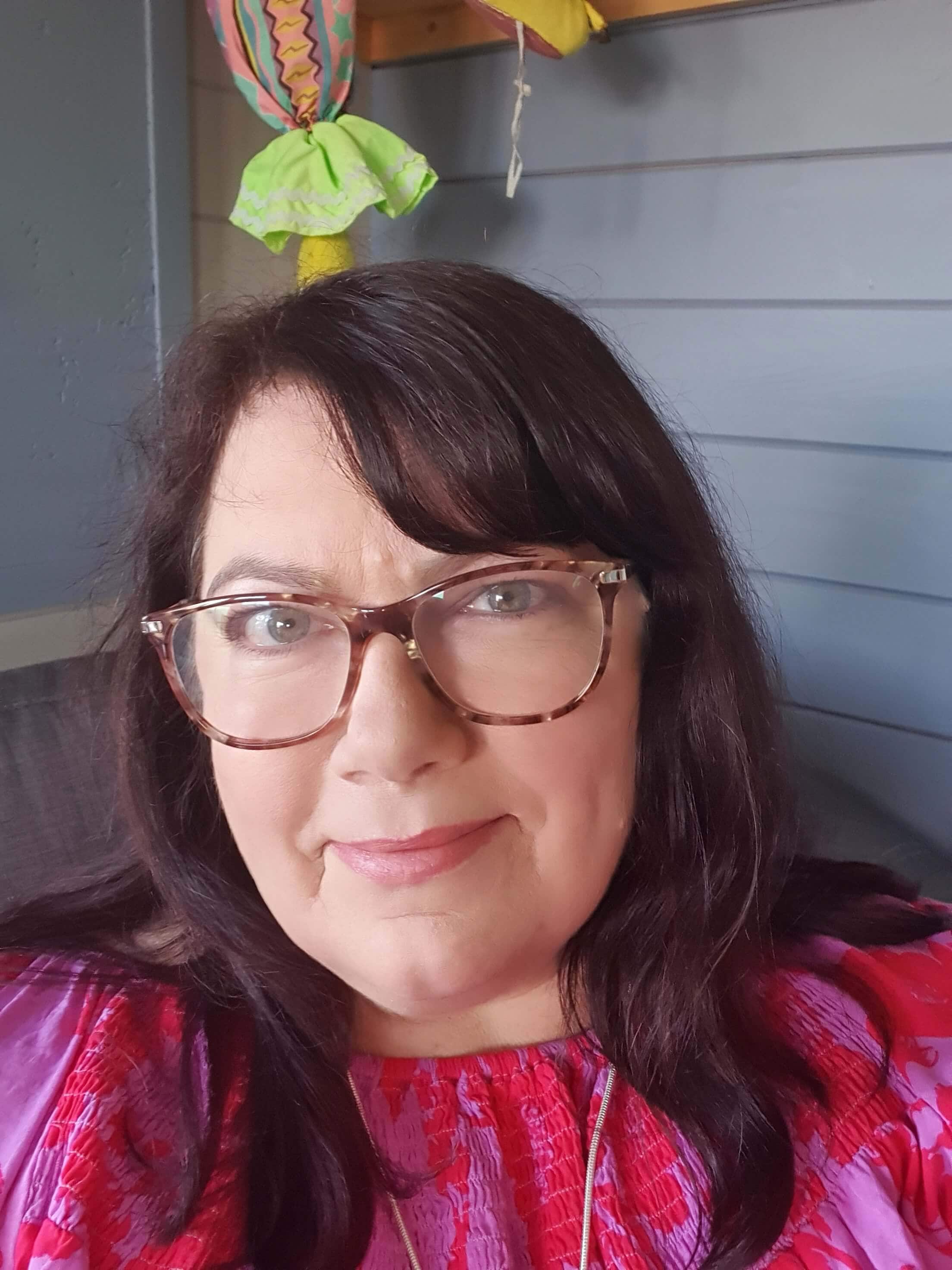
Jodie Clarke is an early childhood professional supporting educators who want and need to stay passionate about the work they do! She has 30 years hands-on experience in the early childhood and human services sectors across many different roles.
Jodie is mum to 3 in Australia and has already helped thousands of educators with their work through her popular blog posts, activity ideas, online training and e-books.
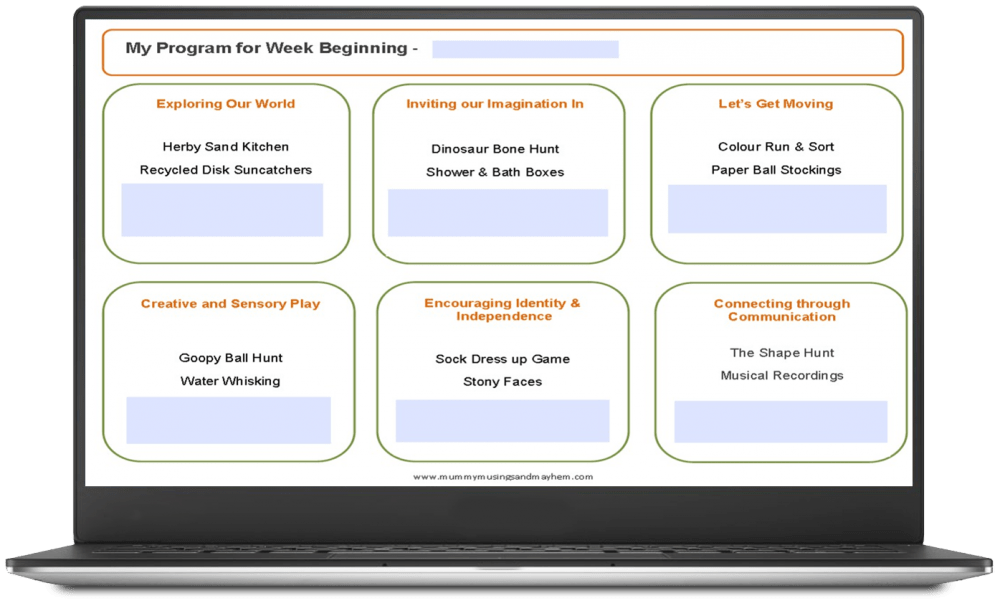
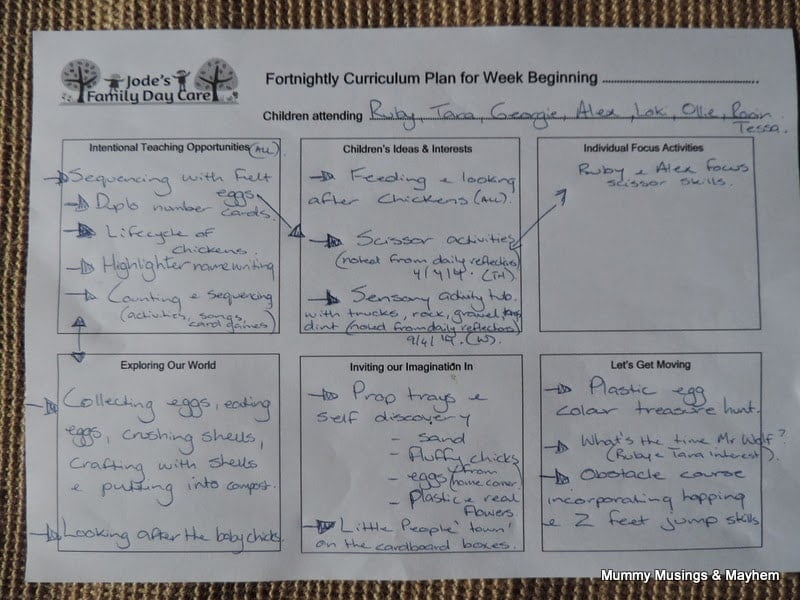
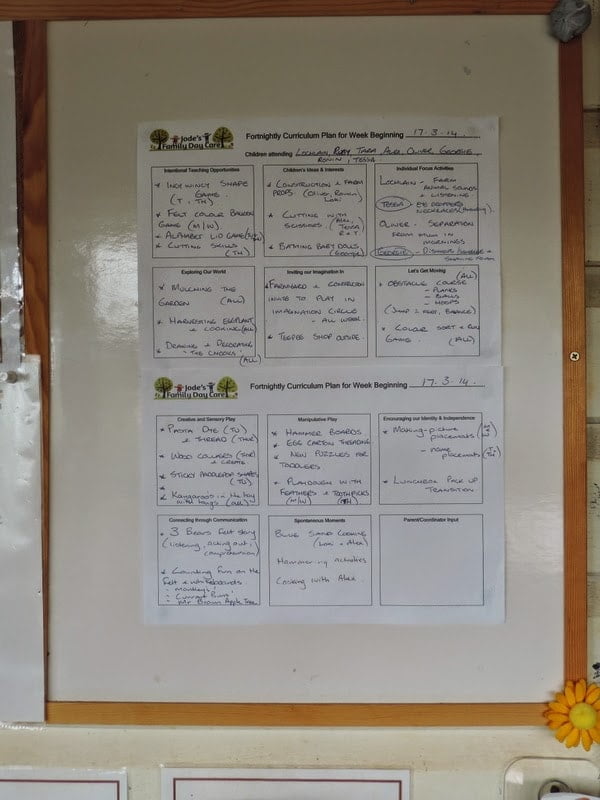
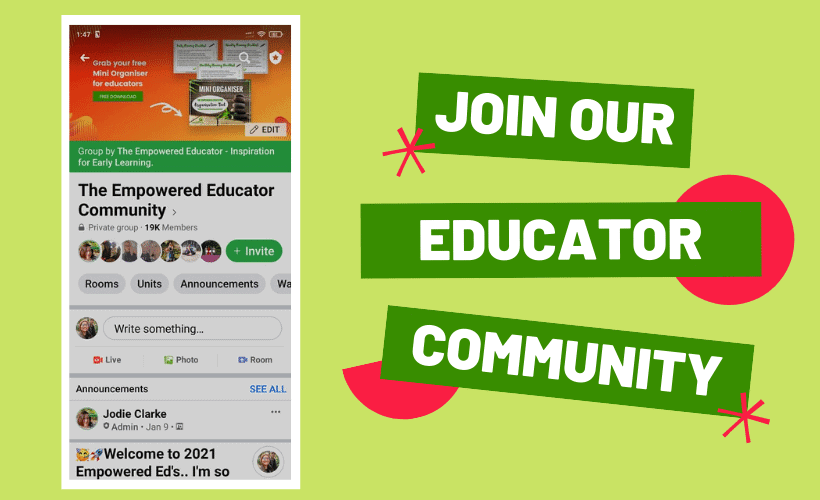
Wow, AGAIN, thank you!! Taking my time, sucking it all in, downloaded your templates to have a play with them & see where/what I’d like to change to fit into our FDC home. Looking forward to your future blogs – What a woman you are!! Gee I hope I can get my head around all this, because I DO LOVE my job, but these days it seems more like my life than my job – not good for me, my family or my day care families 😉
Im with you Bec I love my job and the kids I work with but its consuming every spare moment I have and I have a good program etc. doesn’t help that I also do my husbands paperwork etc for his business too.
I’m so glad the blog posts are proving helpful for you Beth! That’s the best idea, have a play and find what works for you. I’m going to be sharing some routine and time management blogs soon that could help. It can be overwhelming, don’t let it take you over, happy to help if you need further support with the programming. You can contact me via email or my FB page messages 🙂 Thanks so much for reading.
I can’t imagine having to do another business paperwork on top of FDC anonymous! That’s a big job!
Hi Jodie,
thanks for sharing, would you consider the record of individual obs to be your way of including a summative assesment ?
Thanks
Wow, ive done fdc for nearly a year and before my two little ones I fid my diploma and worked in centres.
Having time off to have my 3 yr old and 20 minth old was right when the eylf come in. Ive been so confused but wow your blog helps alot 🙂
I’m so glad to hear the blog is helping. I came back to child care after a huge break away so I have had to get my head around it too and I know how time consuming it can be so that’s why I thought I would share with others what I have learnt 🙂
So many great ideas and such awesome info… pinning this because I’m going to need all the help I can get if/when I go back to teaching!
Thanks for pinning Kate…and you won’t need any help at all ;)!!
Hi Jodie, I have just recently discovered your blog and I am in love. Just one question. How/where do you display your plan with so many pages?
Hi Kerry, so glad to have you here 🙂 I display the first 2 pages on my noticeboard and the third I keep in my planning folder for my own records. Hope that helps!
This is an amazing site . I am a Coordinator of a FDC service and am using many of your methods to help my educators. SO… thank you thank you thank you! for being brave enough to share your ups and downs so others can learn along with you.
Louise
Thanks so much Louise, your comment is why I am trying to share here on the blog. I love that i can help support others and I love that you are such a committed coordinator. I definitely have a lot of downs as well as ups and think it is important to share them all! Do let me know if you have any ideas for future FDC topics 🙂
I love the way you write, it really appeals to my sense of humour!! Thankyou for your informative blog and ideas. Adaption is the key!! Thanks again Jodie.
Katrina
Adaptation is so the key Katrina! And thank you so much for your comment…I think I would go a little nuts without a sense of humour!!
Thank you for sharing, will be sharing with my staff to ease the documenting process! 🙂
Thank you so much! I am an educator at a centre and am starting to get organised ready to open my own FDC in January. Your blog is amazing, a great insight into FDC life.
Looks awesome but still seems like so much paperwork – even if it’s not all on paper! I don’t know how people come up with so many ideas for their plan. Do you do it all after hours or do you get some time during the day for it? I don’t get much during the day and I have no inclination to do paperwork after hours – but I have to do some!
Thanks so much again!!! I so appreciate all your advice and tips you give
My absolute pleasure Sylvs!!
I cant see where to download the free program template, please help??
Hi
Im wondering, why did you not just use one eylf outcome per planning box?
I love your work and im battling away to make my head KNOW that its more simple to plan and observe than im making it
Josie